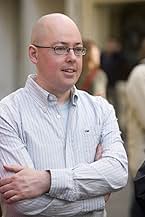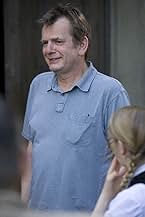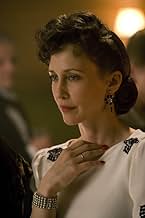L'histoire se déroule pendant la Seconde Guerre mondiale et se déroule à travers les yeux innocents de Bruno, le fils de huit ans du commandant d'un camp de concentration allemand, dont l'am... Tout lireL'histoire se déroule pendant la Seconde Guerre mondiale et se déroule à travers les yeux innocents de Bruno, le fils de huit ans du commandant d'un camp de concentration allemand, dont l'amitié interdite avec un garçon juif de l'autre côté de la barrière du camp a des retombés s... Tout lireL'histoire se déroule pendant la Seconde Guerre mondiale et se déroule à travers les yeux innocents de Bruno, le fils de huit ans du commandant d'un camp de concentration allemand, dont l'amitié interdite avec un garçon juif de l'autre côté de la barrière du camp a des retombés saisissantes et imprévues.
- Réalisation
- Scénario
- Casting principal
- Récompenses
- 7 victoires et 7 nominations au total
- Leon
- (as Zac Mattoon-O'Brien)
Avis à la une
Bruno is an 8 year old German kid whose father David Thewlis is an officer in the Wehrmacht. They're living a nice life in the beginning of World War II in metropolitan Berlin. Thewlis gets orders however shipping him to a command in a nice rural area of southern Germany, presumably Bavaria. Like any other kid he's upset at being dislocated from his friends and his school, but he certainly hasn't much to say in the matter.
So the family is uprooted to a lovely pastoral area where Dad's been put in charge of a concentration camp. Not one of the bigger ones like Auschwitz and Dachau, but a small one that his superiors expect Thewlis to run efficiently.
Young Bruno has absolutely no one to play with and he wanders over to the camp. His parents feel he's way too young to understand about these things and he makes friends with a kid on the other side of the barbed wire, a young Jewish boy named Shmuel who wears those funny striped pyjamas like everyone else in the camp.
Two things struck me about The Boy In The Striped Pyjamas. When I did a review of The Diary Of Anne Frank, the biggest impression I got out of the film was the ordinariness of that small group of Jews hidden in that attic. Who could possibly think these people were any kind of threat to civilization simply for being and believing in their faith? We get to see the other side of the looking glass here, a view of this very average German family, besides young Bruno and Thewlis, there's mother Vera Famiga and daughter Amber Beattie. Famiga is not happy one bit with her domestic situation and it's slowly dawning on her that the politics and policies of the Third Reich is the root of her concerns. As for Beattie, she's really buying into the whole Nazi thing, partly because she's going through puberty and a young and handsome aide to her father played by Rupert Friend is stirring up those first womanly feelings.
But to all intents and purposes this is your average German family, not too much different than the Frank family in that attic, but that this regime of hate has made Thewlis a death merchant.
The second thing that struck me and it's what gives hope to this crazy world is what passes between Asa Butterfield as Bruno and Jack Scanlon as Shmuel. If all we are as humans are reflections of our parents prejudices there would be absolutely no hope for mankind. But we do grow, we do question, some of us just don't accept everything that's fed to us. We don't see Shmuel's world of the camp until the very end, the boys mostly have contact with a barbed wire fence between them. But we see Bruno and his sister being now home schooled in Nazi teachings and his innocent contact with that kid on the other side of the fence makes him question what's going on.
The Boy In The Striped Pyjamas is one of the best films of 2008. You will not forget the performances of Butterfield and Scanlon and the adult cast members. The end will shatter your mind, but the film's depiction of friendship growing in the worst possible circumstances is also a message of hope.
I have taken him to see the film; and was riveted. I think that the style of the film is really that of an old fashioned family film, however the subject matter is emotionally very demanding and all the better for that. It does what good drama should do - makes you think and feel. As the credits ran, at the showing that I saw, no one moved or spoke for a minute or two. The Holocaust is a difficult subject, but to tell a story in such a way that it is accessible to a 12 year is a great achievement.
There have been some comments that the cast speak English (rather than, presumably, German) and that this is somehow a bad thing. What are the alternatives? Either sub-titles or daft 'ello 'ello accents. In some ways the ordinariness of the Nazis and the family points up the horror of what happened that ordinary people can do the worst of things to fellow human beings.
Sophie x x x
The film is mainly shot through the eyes of Bruno played by Asa Butterfield growing up in war time Germany during the holocaust. After relocating at the will of the German Army, the film then centres on the friendship between Bruno and Shmuel (Jack Scanlon). I will end it there as I don't wish to spoil the rest of the film.
Putting to one side the fact that everyone has a flawless English accent (which does make it difficult to hate them at first), the cinematics, sound, editing and above all acting are a credit to the British film industry.
Asa Butterfield is fine young actor and I'm sure will be destined for even greater things in the future.
As I mentioned above, I won't give anything away, but I will say that this is the first time I have been to the Cinema and everyone sat quiet right up until the end of the credits.
Please, please see this film. It will remain with you for a long time.
There will be the predictable comparisons with Schindler's List but you might also want to compare this movie to "The Counterfeiters" which also deals with the conflicts necessary to survive. Watching this movie I kept being drawn back to Primo Levi's book "If This is Man" the story of his time as a prisoner suffering from this evil.
The great success of the film is its simplicity, it does not seek to over analyse but simply allows the development of the characters to tell the story.
One of the contributers spoke of how he was in screen 9 (if I remember correctly) in Cineworld Dublin - I was in Screen 11 and I can had the same experience, the film ended and no one moved, all were in a state of shock, no, sorrow. This is not a film for young children, but older children and adults familiar with the evil addressed in this movie should go and see it. This movie deserves great success. I rate it 9 out of 10 and would have given it a perfect score except for some small technical questions, but none that take away from this fantastic piece of cinema - All associated with this movie should be rightly proud of there work and if any of you read these comments - Thank You!
Le saviez-vous
- AnecdotesBruno's parents are named Ralf and Elsa, but in the credits of the film they are listed as "Father" and "Mother." This is a tribute to the novel, in which the narrative focuses solely on Bruno's point of view.
- GaffesThe Nazi banners at the film's beginning are sheer and translucent: silk, nylon or rayon. Nazi banners were constructed of wool and were never translucent.
- Citations
Shmuel: I wish you'd remembered the chocolate.
Bruno: Yes, I'm sorry. I know! Perhaps you can come and have supper with us sometime.
Shmuel: I can't, can I? Because of this.
[points the electric fence]
Bruno: But that's to stop the animals getting out, isn't it?
Shmuel: Animals? No, it's to stop people getting out.
Bruno: Are you not allowed out? Why? What have you done?
Shmuel: I'm a Jew.
- Crédits fousQuotation displayed before the opening titles: "Childhood is measured out by sounds and smells and sights, before the dark hour of reason grows - John Betjeman"
Meilleurs choix
Détails
- Date de sortie
- Pays d’origine
- Sites officiels
- Langue
- Aussi connu sous le nom de
- El niño con el pijama de rayas
- Lieux de tournage
- Sociétés de production
- Voir plus de crédits d'entreprise sur IMDbPro
Box-office
- Budget
- 12 500 000 $US (estimé)
- Montant brut aux États-Unis et au Canada
- 9 046 156 $US
- Week-end de sortie aux États-Unis et au Canada
- 253 085 $US
- 9 nov. 2008
- Montant brut mondial
- 40 416 563 $US
- Durée1 heure 34 minutes
- Couleur
- Mixage
- Rapport de forme
- 1.85 : 1
Contribuer à cette page





































